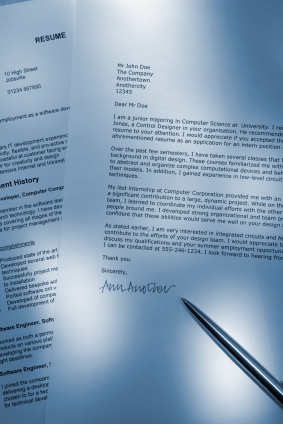
Once you’re unemployed, it can be tempting to go for that easy job that has nothing to do with your field. But maybe you should not be looking for just any job because the right one could be just around the corner. If you are trained in a certain field, it may be hard to find a position in this economy, but that doesn’t mean there are not advantages to focusing on a specific industry. In fact, you can make a case that if you position yourself correctly, you can find the right job quickly.
So what are the advantages of focusing on a specific type of position?
1. Serious job searches are time consuming. If you are unemployed, you should spend at least 30 to 40 hours a week looking for a position. Some people who are not focused put a lot of time and energy into their job search and end up feeling as though they are doing everything in their power. But, their energy is actually focused in other areas, so they are not putting forth the full effort. Focusing on a specific career will give you a leg up on the competition who are looking into different job options.
2. The more contacts you make in your search, the more likely you are to find a desirable position. The more you concentrate on these contacts, the better it will be for your job search. Putting a concerted effort will give you a better chance of something positive happening. The likelihood will be decreased if you focus on several different career paths.
3. Jobs often appear to those who use most of their energy in a specific direction. It will be difficult for people who are all over the map in their job search. HR managers look at the different careers job prospects have had and weigh that carefully when comparing candidates. Job seekers who are not focused rarely make any significant impact or impression on HR managers in order to attract the right position.
4. A productive job search requires that you present yourself convincingly to your prospective employer. Employers are not impressed by statements like, “I do not care what type of job I do” or “I’ll do anything as long as there’s a paycheck in it.” If you present yourself as professional and are focused in both written and verbal communications, you will give them more of a reason to believe in your skills. It’s important to find the right fit for both you and the company, and if you’re just doing a job for a job, you may be shortchanging yourself and the company.
5. Look at it this way–it may be hard to be enthusiastic and extremely well qualified for a 20 different jobs. So stick with what works for you and find the position that makes you happy and pays you well.
The Necessity of Professional Cover Letters
BlogCover LettersJob SearchProfessional ResumesResume KeywordsResume WritingResumes

Many job seekers stress over cover letters more than they do their own resumes. It may surprise some, besides cover letters are typically a one-page preface to your intricately prepared resume. But, the truth is, that your resume may look dull without a good cover letter to introduce it. Cover letters introduce you to HR managers and set the tone for how your resume will be received. You can have a perfect resume, but if the cover letter is not well done, then your resume will not get the type of attention it deserves. Everyone looking for a job should have a professional cover letter and resume in order to find the career that’s right for them.
When you first enter the job market (most of us at around 21 years of age) don’t know how important cover letters are for you, much less how to write one that sells you. Many people are not aware of the benefits that a simple, well-crafted cover letter to a prospective employer can have. They introduce you to your prospective employer, but also they give a glimpse of your personality.
Just a few weeks into your job search, you will realize that a well-crafted cover letter is not an option, it’s a necessity. Through the support of a professional resume and cover letter writer, you can finally have the cover letter that sells your individual personality and traits. If you have a cover letter, it could always use another eye on it in order to see where you can make changes or additions. You want to sell yourself in your cover letter, your resume speaks to what type of experience and qualifications you have, that’s why it’s important to have a cover letter that sets you apart.
But, just having one is usually not enough. After a few weeks or months of unanswered applications and fruitless job searches, you begin to come to a final conclusion.
When you, or your cover letter writer, writes your first letter, the primary focus is on presentation and the format. How long should the cover letter be? Where to assign the date? What type of font is right for my cover letter? But, throughout you want to focus on one thing – quality content. If your cover letter is full of buzz words or just inane babble, then it’s not worth the paper it’s printed on.
It’s always important to remember, before you start writing, that content is king. It’s fairly easy to lose sight of what’s important and lose focus instead of paying attention to what’s important. That doesn’t mean that there are not guidelines to follow, but your cover letter writer can help you deal with the details. You do not want to have spelling or grammatical errors in your cover letter. That’s an instant turn off to any prospective employer. Remember that the main point of your cover letter is to get noticed and sell yourself.
Constructing a Resume That Sells You
BlogCareer & WorkplaceExecutive ResumesJob SearchProfessional ResumesResume KeywordsResume WritingResumesSuccess Strategies

Some people think that resumes are nothing more than a list of your accomplishments, the jobs you’ve had, and the number of places you’ve worked. But, it’s not that easy to construct a resume that markets you to your prospective employer. A resume should be designed to sell you and your potential to an employer. That means that you have to make decisions about how to present your traits.
A resume has to be like an advertisement, it needs to catch the reader’s eye and meet their particular needs. If you’re applying for an accounting job, then you wouldn’t need to showcase your creative writing talents on your resume. You would need to show that you have the skills required to perform the duties of the position at a high level. That doesn’t mean putting everything you’ve ever done on your resume, it just means you have to understand your market and how to reach them. Make sure you put your best foot forward.
Look over your work history and pick the selling points that best highlight your value. Depending on the position, you should highlight specific skills that you have. Deciding what makes the most unique selling points can be the hardest part of writing a resume. Here are five basic steps to help design a resume that markets your skills to employers:
1. Choose the most relevant information first. Focus on the skills and experience that are most important to the job you’re applying for. You may have a whole range of skills, but focus on the ones that are most important for your particular employer. Even if you’re qualified based on past experience, don’t put all of your eggs in one basket. Instead, make sure that you focus on the skills that are going to set you apart from other potential employees.
2. Showcase the cutting edge, without too much emphasis on the outdated. More experienced workers should focus heavily on this. Any professional should continue to update their resume with new talents and show that they can adapt to new challenges. You may know the beginnings of C+ language, but it will help if you know Flash or Linux.
3. Tangible examples are best. Be specific as possible and use tangible evidence of improvements if you can. Just saying that you have an excellent track record of improving sales doesn’t show much, you need to show actual figures.
4. Use multiple resumes to market yourself in a different manner. If you’re applying for several different types of positions or in different industries, you need to have a resume suited to that profession. So create several different resumes that highlight your skills for that particular position.
5. Get a second opinion. This is perhaps the most important thing you can do. It can be hard to be objective about your career. Give your resume to a friend or a family member, or if you have someone in your industry – even better.
Social Media: Choosing, Using, and Confusing
Career CollectiveExecutive ResumesJob SearchNetworkingResume WritingResumesSocial Marketing/Online Branding**I am a member of the Career Collective, a group of resume writers and career coaches. Each month, all members discuss a certain topic. This month, we are talking about Social Media and our careers. Please follow our tweets on Twitter #careercollective. You can also view the other member’s interesting posts at the end of the article.
+++++


Today it seems that everyone from your 10-year-old nephew to your Great Grandmother Mildred has at least a Facebook account filled to the brim with information that you may or may not want them, or other people from divulging – everyone, which includes the same hiring manager you sent your last resume to. Now it’s just much easier for prospective employers to Google your name and find out information about you, your family and your habits. So, what’s the best site and the best methods to keep your personal information private?
With the vast resources of personal data so readily available through social networking sites, it is very tempting for recruiters, HR managers and even yourself, to use these methods to screen prospective employees or to just find out information about an old friend. Microsoft recently released a commissioned study that shows 79% of people will look at an applicants’ online profile. Reviewing a candidates social networking site can help companies know more about how those candidates handle themselves, both personally and professionally. It can also provide information that is illegal to ask during interviews.
It’s true that in today’s world you have to be online in order to get noticed, but what sites are right for keeping your personal information private, while still giving you a measure of freedom online? The most well known sites such as Facebook, LinkedIn, Twitter and Myspace all have their ups and downs. Myspace has virtually vanished as a peer-to-peer social media information site in favor of it’s traditional focus as being a music house for artist. Facebook has it’s many detractors thanks to gaping security holes and the ability to gleam information quickly and easily, even after that information has been deleted. Twitter doesn’t really carry the same weight as the other sites, it’s good for quick burst of information but you cannot really customize it in order to share professional information. LinkedIn is the site that many professionals think of when they are looking for another job. People post links to jobs, information about their companies and things they are looking for. If you stay diligent and become friends with people in your industry, there is no way that LinkedIn would not benefit you.
It also presents an ethical conundrum. What if an HR manager stumbles upon your Facebook page with pictures from a wild party or of your growing baby belly? Would they be more or less inclined to hire you based on what they determine online? According to Microsoft’s study, 84% believe that it is OK to use social media to gather information about a candidate.
Do you know what that means? It means you have to stay up on what you have posted online and watch anything that could prevent you from finding that job. Make sure that you pick the right social media site and use it properly. In the right hands social media can be a very powerful thing, but it can also prevent you from gaining what you want.
++++
Read on for more great Career Collective articles:
Make Your Career More Social: Show Up and Engage, @WalterAkana, #careercollective
You 2.0: The Brave New World of Social Media and Online Job Searches, @dawnrasmussen #careercollective
How to Get a New Job Using Social Media, @DebraWheatman #careercollective
Social Media: Choosing, Using, and Confusing, @ErinKennedyCPRW #careercollective
How to Use Social Media in Your Job Search, @heatherhuhman #careercollective
Updating: A Social Media Strategy For Job Search, @TimsStrategy #careercollective
Your Career Needs Social Media – Get Started, @EliteResumes @MartinBuckland #careercollective
We Get By With a Little Recs from Our Friends, @chandlee #careercollective
Expat Careers & Social Media: Social Media is Potentially 6 Times more Influential than a CV or Resume, @expatcoachmegan #careercollective
Social-Media Tools and Resources to Maximize Your Personalized Job Search, @KatCareerGal #careercollective
Job Search and Social Media: A Collective Approach, @careersherpa #careercollective
How Having Your Own Website Helps You, @keppie_careers #careercollective
Social Media: So what’s the point?, @DawnBugni #CareerCollective
Tools that change your world, @WorkWithIllness #CareerCollective
HOW TO: Meet People IRL via LinkedIn, @AvidCareerist #CareerCollective
Effective Web 2.0 Job Search: Top 5 Secrets, @resumeservice #CareerCollective
Jumping Into the Social Media Sea @ValueIntoWords #CareerCollective
Sink or Swim in Social Media, @KCCareerCoach #CareerCollective
Social Media Primer for Job Seekers, @LaurieBerenson #CareerCollective
Putting the Right Social Media Face First
BlogCareer & WorkplaceJob SearchNetworkingProfessional ResumesResume KeywordsResume WritingSocial Marketing/Online Branding

Face-to-face networking is incredibly important, and if you know your way around, then you have a distinct advantage over much of your competition. You’re making a serious mistake if you do not have a social media presence or if you skip social media sites all together.
If you’ve neglected to create a social media presence, especially on LinkedIn, then you are missing out on an incredible opportunity to find open positions. Targeted, extensive networking is still the number one way to find a job, to achieve this you need to have a complete and up to date profile on several social media sites.
The reason social media is so important is because 83% of employers look to LinkedIn, Facebook and Twitter when looking for new hires. 89% rely exclusively on LinkedIn to fill their empty positions. So if you’re not using social media, then your chances of getting a job are seriously diminished.
Without a solid social media presence on LinkedIn, you make it much harder for HR managers who are looking for you specific skill set to actually find you. Employers will also review your social media sites to examine more information after they have received your resume. So you have to take the necessary steps to stand out and never put a bad face forward.
Here are some tips for putting the right social media face first:
1. Think of your online profile as your brand.
Identify your abilities that set you apart from other applicants. You should define the areas where you excel, and always make a solid case for the value that you bring to a prospective employer.
2. Use your online profile to showcase your skill set.
On Facebook and LinkedIn, there is a headline below where you put your name. This is an incredible important part of your branding, you need to put something with keywords HR mangers will instantly gravitate to. Your headline should show a range of what you are capable of doing.
3. Position yourself as the expert in your field.
Include searchable keywords in your social media profile so that HR mangers can see your in depth experience and talents. Employers will often look through social media sites in search of a fit for a specific problem, if you have your expertise highlighted, then you may be the one they’re looking for. This makes it much easier for them to find you.
4. Clear up any discrepancies between your resume and your social media profiles.
Make sure your dates of employment, job titles and other extended details match your resume. HR managers will not contact prospects who have inconsistencies on their resume and social media profile.
5. Join Facebook or LinkedIn groups that are associated with your field.
Who knows, by commenting on a group post or by offering your advanced knowledge, you could attract someone looking for your particular talents. Answering questions in these groups is an excellent way to attract attention to yourself, just make sure you approach groups with the correct mindset, you’re trying to garner the right attention. So make sure you know what you’re talking about.
What Are Your Options Once Your Short Term Job Ends?
BlogCareer & WorkplaceJob SearchNetworkingResume Writing

Is your current contract about to end? Do you have options once it ends? Everybody has things that they believe will happen, but are those options realistic? If not, then you should start to develop some specific options and have them available by a certain date. Your contract is ending so you need multiple options in case one, or all of them, falls apart.
Your career obviously has options if you’re working on a contract basis, so start searching for the options that fit with your skill set. How many working professionals actually have a clear-cut set path that they would like to follow? How many options do your coworkers have after their job ends?
If you do not have any options once your contract ends, then you need to start developing some career options quick.
Why do you need career options? The job market is tough, but there are still other things that you can do to broaden your horizons. When you have a long-term contract it seems like you don’t need a long list of options, but if you’re working on short-term jobs, then you always have to keep an eye open for something new.
Your career is like a long winding road trip. You may not know the destination but you know where you started from, you know where you want to go, sure there may be detours along the way, but eventually you will want to have a clear destination. If you don’t have all of your options mapped out, then that should be your top goal. So, what are some of your options after your short-term job ends?
1. You could get another short-term contract
If you’ve always had short stays at companies for contract work, then you might be more comfortable working in this manner. This can be a great way to make money and still have your freedom…if you have the stomach for it. And sometimes it can be hard to find another job if your contract ends quickly.
2. Go for a long-term company
If you’re tired of looking for work every 6 months, then why not find a traditional 9 to 5 job? Depending on your chosen field, you could have many different options in a lot of different companies. If you have an accounting degree you’re basically set to work at any company, as long as they need someone to do their taxes, then you’re their person.
3. Try a different profession
What if you feel stagnant during your current work? It doesn’t mean you have to swear off that type of work forever, but you might want to consider a change of scenery. Moving to a different position within your short-term contract employer may provide other options.
4. Extending your contract
If you and your contract employer have a solid working relationship and you like where you’re at, then why not stay there? They obviously could use your talents, so talk to the HR manager about what can be done.
5 Reasons Your Job Search is Still Going
BlogCareer & WorkplaceExecutive ResumesInterviewingJob SearchNetworkingProfessional ResumesResume WritingResumes

In order to advance your career and get your job search back on track, there are a few things that you must do correctly. As a job seeker, finding a job should be your full-time job. Many people work tirelessly to find a job, but they keep coming up short, so today we’re going to have a look at the 5 reasons that your job search is still going and why you’re not getting the response that you feel you should. If you find yourself doing any of the following, then today is a great day to take action.
1. You do not make your job search personal
What this means is that you’re still sending out generic resumes with no target. Instead, get personal. Find the names of HR Managers, company directors or anyone involved in the hiring at the company. Then you send them a personalized note with your custom made resume to their company explaining your desired position and how you could help the company.
2. You are looking in the same place as everyone else
One thing you have to keep in mind is that there are a lot of unemployed people right now. Many of these people will be looking in the exact same field, geographical area or they have the same skill level as yourself. One way around this is to find opportunities through networking, online job searches and by using job boards to find hidden career options. If everyone is looking in the same place, it will only drown out your voice. Be different and look at all of your options.
3. You believe every word you hear about the recession
If you think everyone is living hand to mouth, then you are very mistaken. America has a lot of opportunity for people who are willing to look. Yes, it’s tougher than usual, but not impossible to find a job that suits you. Take a few minutes to review the positive aspects and reduce your stress level. An open mind will lead towards an open job.
4. Poor email etiquette
Every time there is a job fair, we see this problem emerge. People do not read their emails and proof them, but you can bet that your prospective employer is reviewing every little detail about your resume. Misuse the word “your” in place of “you’re” and it’s a dead giveaway that you did not proof your email. Another way that people send out poorly written or constructed emails is if they do not have a subject, have a subject line that reads, “have a look at my resume” or poorly written opening lines in the email. Try to show a little patience and take some time to review your emails before you send them.
5. You’re not as productive as you believe
Sending out a few resumes during the morning and then taking the rest of the day to watch some TV is not a productive job search. Get into the habit of diligently looking for a job. Make yourself a schedule and stick to it. All you have is you. So, work hard and you will find the right career for you.
